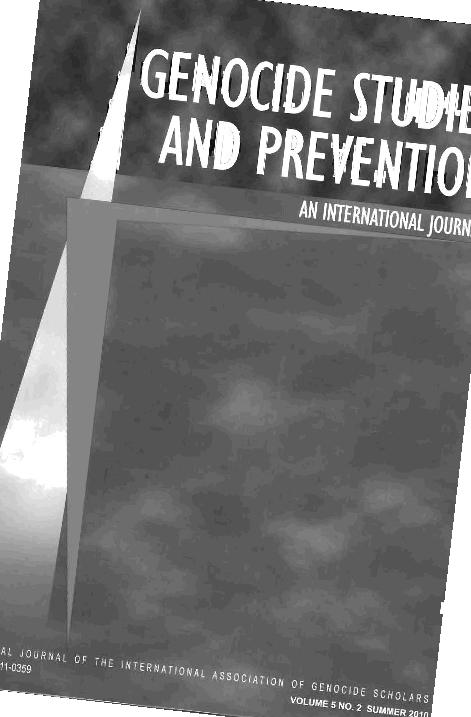Mostrar el registro sencillo del ítem
dc.contributor.author
Delrio, Walter Mario

dc.contributor.author
Lenton, Diana Isabel

dc.contributor.author
Musante, Marcelo
dc.contributor.author
Nagy, Mariano Ariel

dc.contributor.author
Papazian, Alexis Esteban Roberto

dc.contributor.author
Pérez, Pilar María Victoria

dc.date.available
2018-09-05T16:02:01Z
dc.date.issued
2010-08
dc.identifier.citation
Delrio, Walter Mario; Lenton, Diana Isabel; Musante, Marcelo; Nagy, Mariano Ariel; Papazian, Alexis Esteban Roberto; et al.; Discussing Indigenous Genocide in Argentina: Past, Present, and Consequences of Argentinean State Policies toward Native Peoples; International Association of Genocide Scholars; Genocide Studies and Prevention; 5; 2; 8-2010; 138-159
dc.identifier.issn
1911-0359
dc.identifier.uri
http://hdl.handle.net/11336/58381
dc.description.abstract
For a long time the historiographical and anthropological narrative in Argentina contributed to a double assumption that is nowadays strongly grounded in citizens' common sense. On the one hand, the extinction of Indigenous peoples is vaguely dated to a period from the Spanish conquest to the military campaigns known as the “conquest of the desert”; on the other hand, such extinction is simultaneously interpreted as a “natural” process in universal history. Argentine state policies were thus naturalized. It is frequently assumed that this set of natural processes might have left only individual “descendants,” in place of political entities. Therefore, modern Argentine society would be the outcome of a European “melting pot” in which the Indigenous component is absent. We postulate that physical elimination, concentration practices, deportation, enslavement, identity cleansing of children, and cultural destruction constitute mechanisms of homogenization that add up to conceptualizing policies toward Indigenous peoples in Argentina as genocide. Ethnic politics following the military campaigns were based on the assumption of the near-“extinction” of those peoples. Federal and provincial governments constructed their policies on the basis of considering Indigenous peoples as “survivors,” “the final remains of an ending culture,” “the few left,” and so on, omitting to name the causes of that supposed extinction. Our focus in this article is on current cultural policies that announce intercultural, plurality, and diversity goals while at the same time aiming to limit the margins of Indian political autonomy. We propose that this genocidal project is linked inextricably to the constitution and organization of the Argentine national state.
dc.format
application/pdf
dc.language.iso
eng
dc.publisher
International Association of Genocide Scholars
dc.rights
info:eu-repo/semantics/openAccess
dc.rights.uri
https://creativecommons.org/licenses/by-nc-sa/2.5/ar/
dc.subject
Genocidio
dc.subject
Indígenas
dc.subject
Argentina
dc.subject
Conquista
dc.subject.classification
Historia

dc.subject.classification
Historia y Arqueología

dc.subject.classification
HUMANIDADES

dc.title
Discussing Indigenous Genocide in Argentina: Past, Present, and Consequences of Argentinean State Policies toward Native Peoples
dc.type
info:eu-repo/semantics/article
dc.type
info:ar-repo/semantics/artículo
dc.type
info:eu-repo/semantics/publishedVersion
dc.date.updated
2018-09-04T18:35:31Z
dc.identifier.eissn
1911-9933
dc.journal.volume
5
dc.journal.number
2
dc.journal.pagination
138-159
dc.journal.pais
Canadá

dc.journal.ciudad
Toronto
dc.description.fil
Fil: Delrio, Walter Mario. Universidad Nacional de Río Negro; Argentina. Consejo Nacional de Investigaciones Científicas y Técnicas; Argentina
dc.description.fil
Fil: Lenton, Diana Isabel. Universidad de Buenos Aires; Argentina. Consejo Nacional de Investigaciones Científicas y Técnicas; Argentina
dc.description.fil
Fil: Musante, Marcelo. Universidad de Buenos Aires; Argentina
dc.description.fil
Fil: Nagy, Mariano Ariel. Universidad de Buenos Aires; Argentina. Consejo Nacional de Investigaciones Científicas y Técnicas; Argentina
dc.description.fil
Fil: Papazian, Alexis Esteban Roberto. Universidad de Buenos Aires; Argentina. Consejo Nacional de Investigaciones Científicas y Técnicas; Argentina
dc.description.fil
Fil: Pérez, Pilar María Victoria. Universidad Nacional de Río Negro; Argentina. Consejo Nacional de Investigaciones Científicas y Técnicas; Argentina
dc.journal.title
Genocide Studies and Prevention
dc.relation.alternativeid
info:eu-repo/semantics/altIdentifier/doi/http://dx.doi.org/10.3138/gsp.5.2.138
dc.relation.alternativeid
info:eu-repo/semantics/altIdentifier/url/https://utpjournals.press/doi/10.3138/gsp.5.2.138
Archivos asociados
